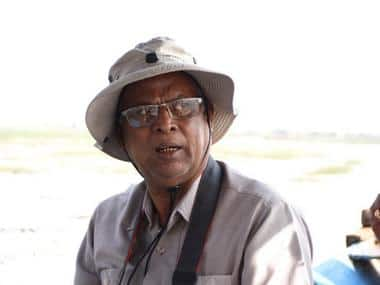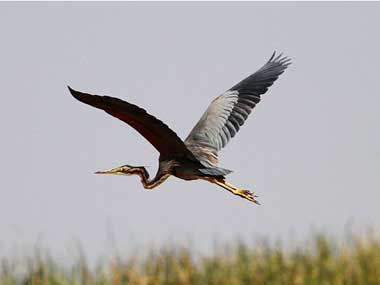If you happen to be a serious bird lover then Mangalajodi in Odisha is the place you don’t want to miss. A village on the famous Chilka lake, Mangalajodi attracts a variety of migratory birds that love to feast on fish. From shell ducks, godwits, pelicans, egrets, cormorants, purple herons, open-billed storks to the kingfisher and many more, the list is an endless delight for nature-loving shutterbugs and ornithologists alike. [caption id=“attachment_6191581” align=“alignleft” width=“380”]
 A purple heron in its glorious flight in Odisha’s Mangalajodi. Asif Khan/Firstpost[/caption] Mangalajodi deserves an extra kudos for transforming itself by eliminating its once dominating boggart of poaching to the virtue of conservation, protecting rare species from ending up on lunch plates as haute cuisine or as some local dish connoisseurs would love to relish. It is for these protectors of the winged species that World Wildlife Day which was celebrated on 3 March has a special meaning. British Broadcaster and Natural historian Sir David Attenborough once said, “It’s surely our responsibility to do everything within our power to create a planet that provides a home not just for us, but for all life on Earth.” World Wildlife Day is an opportunity to rejoice the many beautiful species nature has bestowed us with but it also comes with a promise of protecting the wild and natural wonders around us. A lot has been done to conserve our wild species but there lay a long road ahead. The government, the policymakers, the local communities in and around forests, the visitors – everyone has a responsibility to prevent these birds from going extinct. In fact, community-owned conservation is a need of the hour and Mangalajodi rightfully fits the bill with pride. This story, which is now a legend of sorts, is not an overnight tale. It required people from all age group to understand, determination to assimilate with the spirit of conservation and a firm belief that the existence of these birds needs to be celebrated and not killed for food or livelihood. Mangalajodi was once a village of poachers. A huge marshland along the northern edge of Chilika Lake is around 60 kilometres from state capital Bhubaneswar. Guns, spears and nets were a common sight in this nondescript Odisha village until one man decided to change the fate of it. Nand Kishore Bhujbal, a resident of Tangi, situated some 5 kilometres from the Mangalajodi, took it upon himself to save the furry-winged guests that arrive here every winter. Poaching was rampant in Mangalajodi and the birds were killed to be sold in the local market at a varying price from Rs 20 to Rs 60, depending on the species. “This used to be my favourite childhood spot. But when I came here during 1996, I was shocked to see the selling of birds in an open market. There were a greater number of birds on the handcarts then in and around the lake. That was a day I decided to do everything possible to protect my childhood dream. From then till now, Mangalajodi witnesses more than 2 lakh birds every year,” said Bhujbal. [caption id=“attachment_6194581” align=“alignright” width=“380”]
A purple heron in its glorious flight in Odisha’s Mangalajodi. Asif Khan/Firstpost[/caption] Mangalajodi deserves an extra kudos for transforming itself by eliminating its once dominating boggart of poaching to the virtue of conservation, protecting rare species from ending up on lunch plates as haute cuisine or as some local dish connoisseurs would love to relish. It is for these protectors of the winged species that World Wildlife Day which was celebrated on 3 March has a special meaning. British Broadcaster and Natural historian Sir David Attenborough once said, “It’s surely our responsibility to do everything within our power to create a planet that provides a home not just for us, but for all life on Earth.” World Wildlife Day is an opportunity to rejoice the many beautiful species nature has bestowed us with but it also comes with a promise of protecting the wild and natural wonders around us. A lot has been done to conserve our wild species but there lay a long road ahead. The government, the policymakers, the local communities in and around forests, the visitors – everyone has a responsibility to prevent these birds from going extinct. In fact, community-owned conservation is a need of the hour and Mangalajodi rightfully fits the bill with pride. This story, which is now a legend of sorts, is not an overnight tale. It required people from all age group to understand, determination to assimilate with the spirit of conservation and a firm belief that the existence of these birds needs to be celebrated and not killed for food or livelihood. Mangalajodi was once a village of poachers. A huge marshland along the northern edge of Chilika Lake is around 60 kilometres from state capital Bhubaneswar. Guns, spears and nets were a common sight in this nondescript Odisha village until one man decided to change the fate of it. Nand Kishore Bhujbal, a resident of Tangi, situated some 5 kilometres from the Mangalajodi, took it upon himself to save the furry-winged guests that arrive here every winter. Poaching was rampant in Mangalajodi and the birds were killed to be sold in the local market at a varying price from Rs 20 to Rs 60, depending on the species. “This used to be my favourite childhood spot. But when I came here during 1996, I was shocked to see the selling of birds in an open market. There were a greater number of birds on the handcarts then in and around the lake. That was a day I decided to do everything possible to protect my childhood dream. From then till now, Mangalajodi witnesses more than 2 lakh birds every year,” said Bhujbal. [caption id=“attachment_6194581” align=“alignright” width=“380”]
 Nand Kishore Bhujbal, who formed the Sri Mahavir Pakshi Suraksha Samiti. Image: Ankita Virmani[/caption] He started educating the locals on the possible downsides of the dwindling bird population. However, it was an uphill task for Bhujbal to convince the rural folks to give up their livelihood until he ensured an alternate mean of sustenance to the families. He formed a bird protection council called Sri Mahavir Pakshi Suraksha Samiti and established Mangalajodi ecotourism in 2003 incorporating the local delicacy and lifestyle. The vision was to provide the sustainable livelihood to the locals. The cottages in the ecotourism hut were built of bamboo and mud and were named after the most popular birds in Mangalajodi. One man’s iron resolve can sometimes be a community’s unyielding desire to deliver. Both Bhujbal and Mangalajodi are fortunate in this respect. Today, Mangalajodi attracts birds and tourists from all over the world. It is in fact recognised as an International Bird area. The village turns into a carnival of birds every winter and is a host to around 240 species of birds (89 local, rest migratory). Reborn as conservationists, the erstwhile poachers today patrol and protect their birds. Some of them have turned into guides for the visiting tourists, some became boat riders and the others run the cottages. “A total of 90-100 boats take tourist for the birding tour during the peak season, that is from October to February,” said Bhujbal. Mangalajodi is indeed a birdwatcher’s paradise. No longer haunted by hunters who have now turned into protectors, the winged guests have found a safe home in India’s largest lagoon albeit in a small corner of the world.
Nand Kishore Bhujbal, who formed the Sri Mahavir Pakshi Suraksha Samiti. Image: Ankita Virmani[/caption] He started educating the locals on the possible downsides of the dwindling bird population. However, it was an uphill task for Bhujbal to convince the rural folks to give up their livelihood until he ensured an alternate mean of sustenance to the families. He formed a bird protection council called Sri Mahavir Pakshi Suraksha Samiti and established Mangalajodi ecotourism in 2003 incorporating the local delicacy and lifestyle. The vision was to provide the sustainable livelihood to the locals. The cottages in the ecotourism hut were built of bamboo and mud and were named after the most popular birds in Mangalajodi. One man’s iron resolve can sometimes be a community’s unyielding desire to deliver. Both Bhujbal and Mangalajodi are fortunate in this respect. Today, Mangalajodi attracts birds and tourists from all over the world. It is in fact recognised as an International Bird area. The village turns into a carnival of birds every winter and is a host to around 240 species of birds (89 local, rest migratory). Reborn as conservationists, the erstwhile poachers today patrol and protect their birds. Some of them have turned into guides for the visiting tourists, some became boat riders and the others run the cottages. “A total of 90-100 boats take tourist for the birding tour during the peak season, that is from October to February,” said Bhujbal. Mangalajodi is indeed a birdwatcher’s paradise. No longer haunted by hunters who have now turned into protectors, the winged guests have found a safe home in India’s largest lagoon albeit in a small corner of the world.
For poachers-turned-preservers of birds in Odisha's Mangalajodi, World Wildlife Day is not just on 3 March, it's every day
Ankita Virmani
• March 4, 2019, 21:16:05 IST
Nand Kishore Bhujbal, a resident of Tangi, took it upon himself to save the furry-winged guests that arrive in Mangalajodi every winter.
Advertisement
)
End of Article